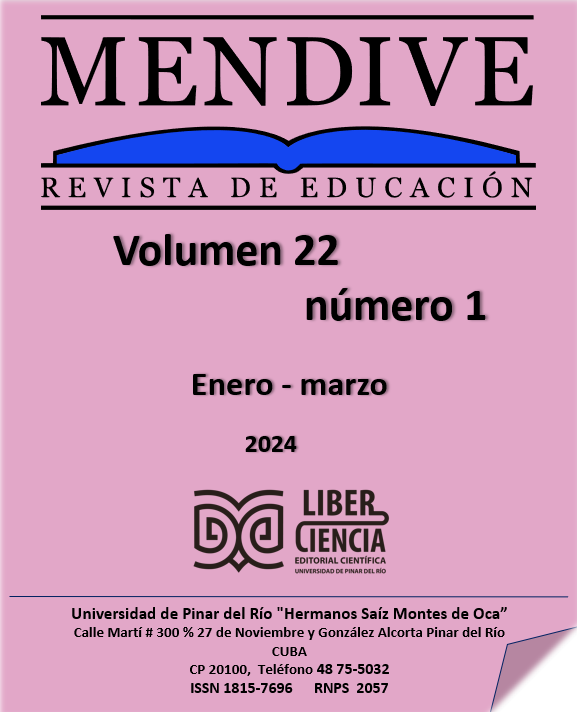Mediation in the textual comprehension of students with autism spectrum disorder
Main Article Content
Abstract
To favor the process of comprehension of texts in students with autism spectrum disorder, it is necessary to start from the conception that every individual has the capacity to learn and develop in different fields, it is enough that the appropriate resources are used. In response to this problem, research is carried out that aims to argue particular ideas and points of view about the peculiar nature of the text comprehension process in the education of students with autism spectrum disorder, from a cultural-historical position, which claims of an organization that takes into account social and instrumental mediation. In its development, theoretical-level methods such as analytical-synthetic, induction-deduction, hypothetical-deductive, observation and interview were taken into account, as well as those corresponding to descriptive and inferential statistics that allowed collecting, interpreting and process the information related to the subject. It is also intended to assess the process of text comprehension from a socio-communicative perspective that favors the social inclusion of students with autism spectrum disorder.
Downloads
Article Details

This work is licensed under a Creative Commons Attribution-NonCommercial 4.0 International License.
References
Aguiar Aguiar, G., Mainegra Fernández, D., & García Reyes, O. (2020). Enseñar comprensión de textos a escolares con trastornos del espectro autista: Secretos desde la experiencia. Revista Electrónica Educare, 24(2), 26.
Cassany, D. (2006). Taller de textos. Leer, escribir y comentar en al aula. Paidós. https://www.upf.edu/web/daniel_cassany/taller-de-textos
Celis Alcalá, G., & Ochoa Madrigal, M. G. (2022). Trastorno del espectro autista (TEA). Revista de la Facultad de Medicina (México), 65(1), 7-20. https://doi.org/10.22201/fm.24484865e.2022.65.1.02
Choquichanca Lavado, R. E., & Inga Arias, M. G. (2020). Estrategias metodológicas docentes en comprensión lectora y rendimiento académico en el área de Comunicación. Desde el Sur, 12(2), 479-500. https://doi.org/10.21142/des-1202-2020-0027
González, M. C., Vásquez, M., & Hernández-Chávez, M. (2019). Trastorno del espectro autista: Diagnóstico clínico y test ADOS. Revista chilena de pediatría, 90(5), 485-491. https://doi.org/10.32641/rchped.v90i5.872
Rojas, V., Rivera, A., & Nilo, N. (2019). Actualización en diagnóstico e intervención temprana del Trastorno del Espectro Autista. Revista chilena de pediatría, 90(5), 478-484. https://doi.org/10.32641/rchped.v90i5.1294
Ruiz Adalid, P., & Navarro Eslava, R. A. (2020). El método TEACCH como herramienta en la intervención educativa de adolescentes de 14 años, con trastorno de espectro autista. Quaderns digitals: Revista de Nuevas Tecnologías y Sociedad, 91, 3.
Tamarit, J. (2020). Intervention in Autism Spectrum Disorder, ASD. Milestones and challenges. Journal for the Study of Education and Development, 43(4), 872-884. https://doi.org/10.1080/02103702.2020.1810941
Velarde-Incháustegui, M., Ignacio-Espíritu, M. E., & Cárdenas-Soza, A. (2021). Diagnóstico de Trastorno del Espectro Autista-TEA, adaptándonos a la nueva realidad, Telesalud. Revista de Neuro-Psiquiatría, 84(3), 175-182. https://doi.org/10.20453/rnp.v84i3.4034
Verdugo Alonso, M. Á., Canal Bedia, R., Sotillo Méndez, M., Morueco Alonso, M., & Tamarit Cuadrado, J. (2021). Ángel Rivière en el corazón y en la memoria de la psicología española y del autismo. Siglo Cero, 52(2), Art. 2. https://doi.org/10.14201/scero2021522742
Vygotsky, L. S. (1997). Obras Escogidas Tomo V. Fundamentos de la defectología. Editorial Pedagógica. https://proletarios.org/books/Vygotsky_Obras_Escogidas_TOMO_5.pdf


